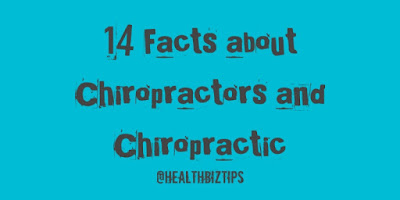14 Facts about Chiropractors and Chiropractic

When it comes to musculoskeletal problems, chiropractors and chiropractic usually steps into the scene. But, did you know this profession's scope can extent beyond body pain. Here are 14 facts you should know. 14 Facts about Chiropractors and Chiropractic @healthbiztips 1. Chiropractors are not medical doctors. Chiropractic practice does not involve the use of medicine nor an invasive surgery to heal. Instead, this holistic practice prefers technique such as diet, exercise, massage, and hands-on manipulation of joints. 2. Chiropractors are professional practitioners of chiropractic. 3. Chiropractic is a form of complementary and alternative medicine (CAM). This practice does not rely on the use of medicine to heal. 4. In order to get a Doctor of Chiropractic (D.C.) degree, an undergraduate must pursue a bachelor's degree in chiropractic education. 5. The scope of practice of a chiropractor varies by country/state. There are countries/states that allow a chiropractor to prescri...




